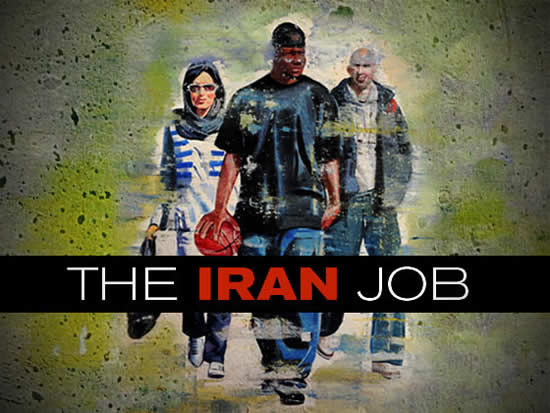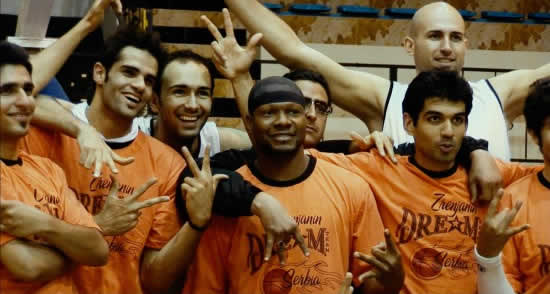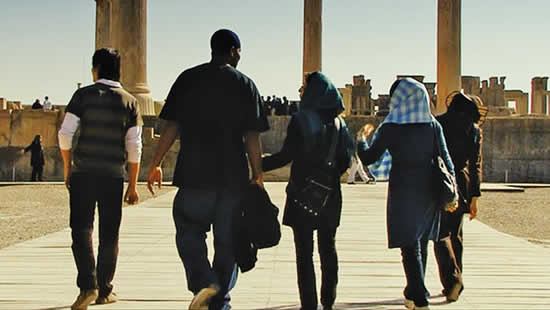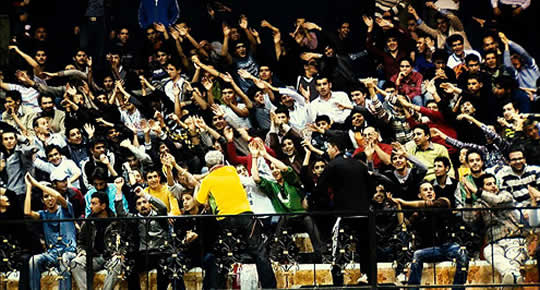 THE IRAN JOB follows American basketball player Kevin Sheppard as he accepts a job to play in one of the world’s most feared countries: Iran.
THE IRAN JOB follows American basketball player Kevin Sheppard as he accepts a job to play in one of the world’s most feared countries: Iran.
With tensions running high between Iran and the West, Kevin tries to separate sports from politics only to find that politics is impossible to escape in Iran.
Along the way he forms an unlikely alliance with three outspoken Iranian women. Thanks to these women, his apartment turns into an oasis of free speech, where they discuss everything from politics to religion to gender roles.
Kevin’s season in Iran culminates in something much bigger than basketball: the uprising and subsequent suppression of Iran’s reformist Green Movement – a powerful prelude to the sweeping changes across the Middle East in the wake of the Arab Spring.
Bijan Tehrani: Congratulations on this very interesting film. How did you come across this subject?
Till Schauder: In 2008, a friend of mine sent me an article about a handful of American basketball players who signed up to play in Iran. I was surprised to hear that there was basketball in Iran, and second that Americans would even have the option to go there, since we have an embargo and all of that. Given the fact that we don’t even have diplomatic relations between Iran and America, I felt that this was a really good opportunity to start a dialogue through athletes. What I found is that some of these players actually faced legal repercussions from playing there—not from the Iranians, but from the American state department, which argues that they were breaking the embargo by making an income in Iran. I felt that this was just a very unhelpful approach to this because when you already don’t have an embassy exchange, what could be better than having athletes paving the way for halfway normal dialogue between the counties? So that was sort of the first impotence, and it was an opportunity to tell a story that could bring people together through sports.
BT: How challenging was it to make The Iran Job? Did you go to Iran?
TS: There were many challenges. My wife, who is also the producer of the film, and I originally wanted to go with a real crew—three, almost four people. To do that, you need journalist visas and shooting permission; we tried to get those documents and failed. First, the Iranian department mission to UN was cooperative, but out of the blue one day, they told us that we were not getting those permissions and our project was garbage. They used the Farsi word for garbage and they said that we couldn’t shoot there. That really changed the whole trajectory of the film, because at that point it became clear that we could not bring a crew, so I decided to go on my own. I have two passports, an American one and German one. I knew that entering Iran as a tourist with my German passport would be easier than with my American passport, so I packed a very small camera with one cable and a small bag and entered as a tourist. That sort of forced me to work as a one person crew basically, and I had to do the whole film under the radar. It affected the film because I was very unobtrusive; the people that I filmed were not nervous—I don’t think I was very intimidating to them as just one person with a camera and this allowed me to get more personal access to them. Shooting it was not difficult because people were very open and hospitable. In retrospect, had I been caught by officials, I could have gotten into trouble actually. In fact, on my last trip to Iran, I was detained. They put me on a black list and they said I could not enter the country anymore. Luckily, they just sent me to a detention center and sent me back; that was really a stroke of luck, in retrospect—other filmmakers were kept there for much longer.
BT: For someone who is not familiar this subject, it’s an unexpected film because it shows how much influence the United States has in Iran.
TS: That was one of the biggest discoveries: just how much Iranians like Americans. I was shocked, and so was Kevin, to realize how informed the younger population is about American culture, American values and everything American. They are very well versed with music and film and everything concerning American culture, and this is something that most people in America just don’t know. If you take an opinion poll in Iran and ask their opinions about Americans, they typically get very high approval ratings, even more than in countries that are supposed to be allies with the US. This is important to know because if you are consciously fed information, as an American, that all people there are the same then we are dealing with completely incorrect assumptions. I think one of the things this film could do is introduce the people to each other in a way.
 BT: How did you develop the story for The Iran Job?
BT: How did you develop the story for The Iran Job?
TS: I think basketball plays a role there. I think it is also because my background as a filmmaker is in fiction films, so it was always my concern to tell a story that entertains people. There is no point in making a documentary when you can’t hold an audience’s attention—you might have really good intentions, but if your audience falls asleep in 15 minutes, then they will not know what your intentions were. So you have to find a way to tell your story in an entertaining fashion. Obviously sports provided one opportunity, but what is more crucial is to find a character that can actually carry a film. That is where Kevin Shepherd comes in because he has unique personality, and by way of his curiosity, interest level, sense of humor and personality, he is someone who has intrigue and can fascinate an audience. Because of these character traits, he can also attract Iranians who are interesting. This created a good group of characters and created a good storyline outside of basketball, most importantly the one with the three women that he meets where he really gets an in depth exchange about women’s rights and generally what young people go through in Iran. He also makes some of the friendships with his teammates; all of these storylines make the film more than your typical documentary because you can laugh and enjoy the ride.
BT: The film has several layers: you have sports, you have an American in Shiraz, you have the story of the young Iranian girls fighting for their lives—it is very interesting that the film carries all of them together.
TS: Right, I was lucky in capturing that footage. When you have that material, you have to weave it into one clear and coherent storyline, which was one of the biggest challenges, and I am glad that you perceived it as entertaining. I think another aspect that really helped is the soundtrack. When I first came to Iran, I was immediately surprised by the music that young people listened to in their cars—rap and hip-hop, which is technically illegal in Iran, and I think that music is reflective of the cultural zeitgeist. By having these Iranian rappers on our soundtrack, you get a sense that you are witnessing the zeitgeist of a generation, and I think that is why the film moves along quite nicely.
BT: I think this is a very positive film, but knowing the Iranian government and their history, what will become of the women who spoke openly against the government in the film?
TS: First of all, I don’t think they are bashing the government; they are talking about their personal aspirations and dreams. I think whatever they do in the film is always in a very respectful way and they don’t always agree on everything, they have opinions just like in any other country. It remains to be seen if any action is taken against them. The main thing, and what the audience takes away from the film I believe, is to celebrate humanity no matter if your Iranian, American or anything else—and also regardless of your religious background. It celebrates the fact that we as people take a leap of faith and try to engage with one another and something can be done to bridge the gap; I think even you are a very conservative Iranian politician, you will recognize this in the film. Hopefully people see the reality because the people of Iran are shown in a human light, a different light than what most Americans are usually shown about Iranians. In a weird way, the film might even appeal to conservative Iranians as well. I am always an optimist, and I hope that there will be instances where the film can be shown in Iran so we can have conversations.
BT: Any future projects lined up?
TS: There are a few in the making. One is another documentary about an athlete who does more than just his sport, but its too early to talk about it. We have also had some interest in the movie rights to the Iran Job, so there is a possibility that the film might be developed into an actual feature film.
BT: Sounds like you are on a great path. Congratulations again on a fantastic film, and best of luck to you!

